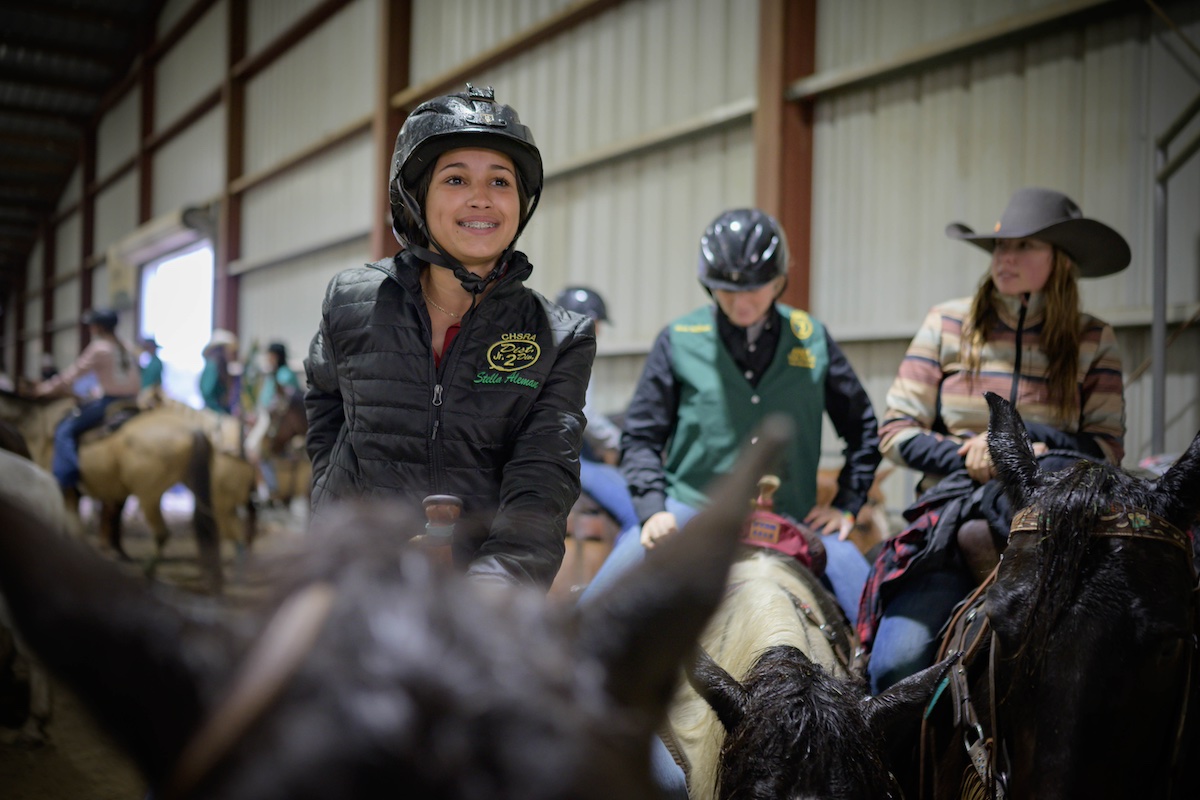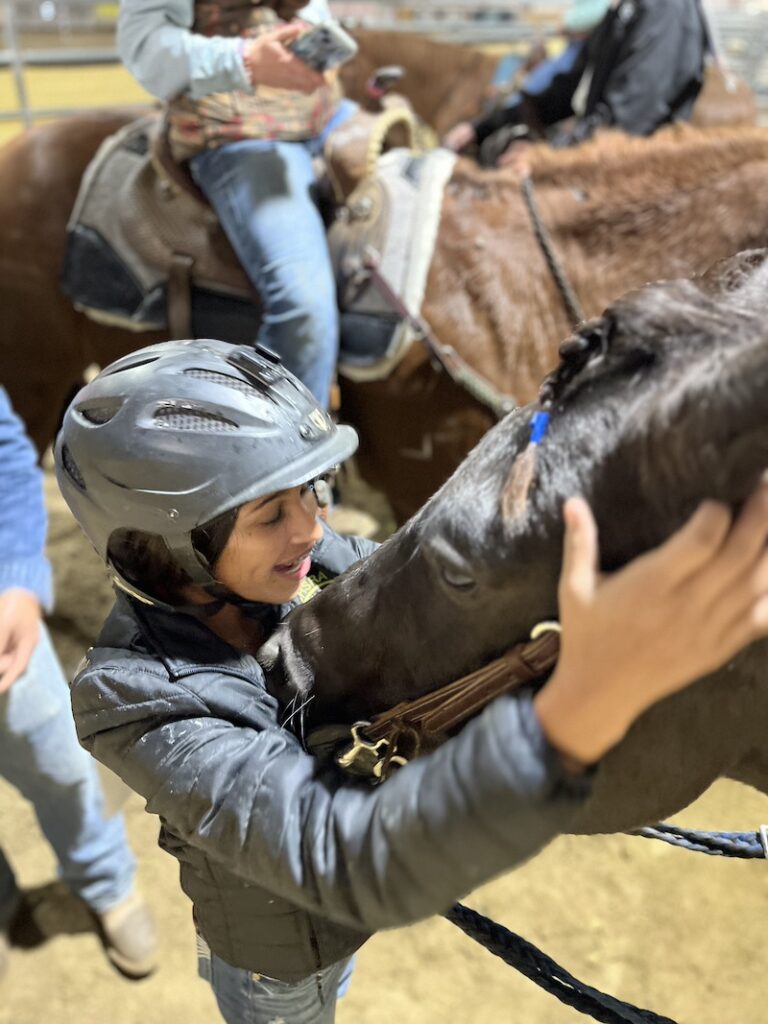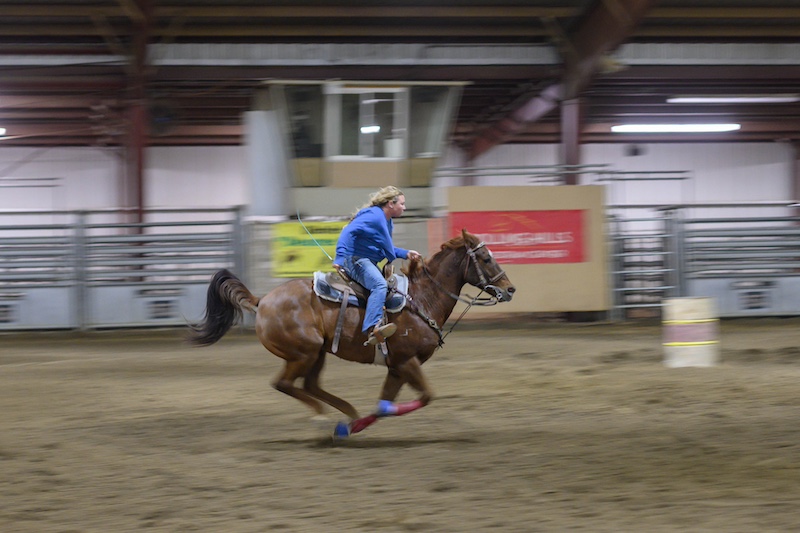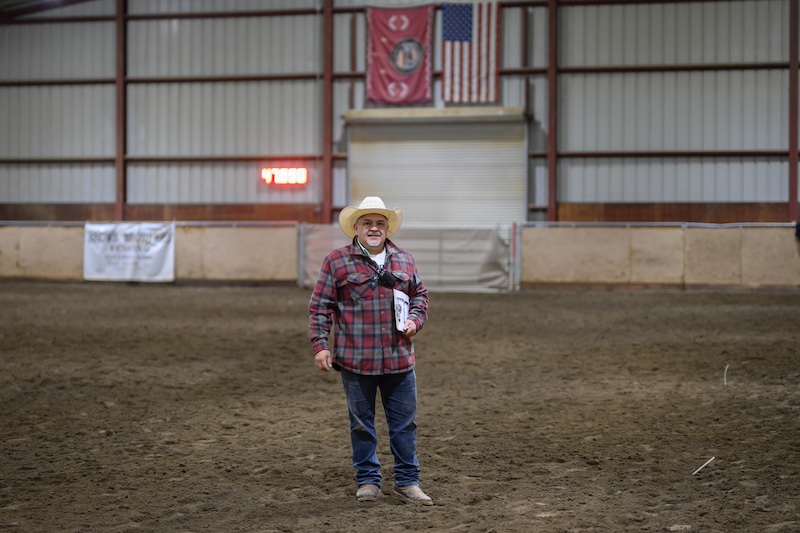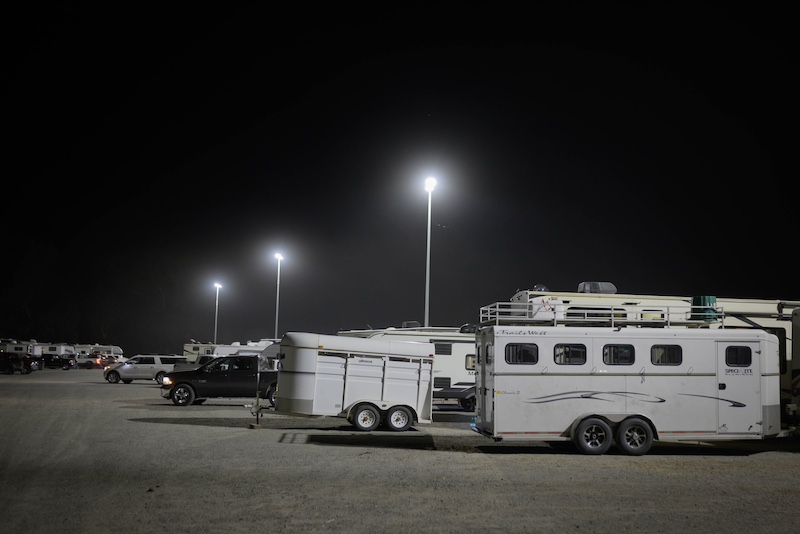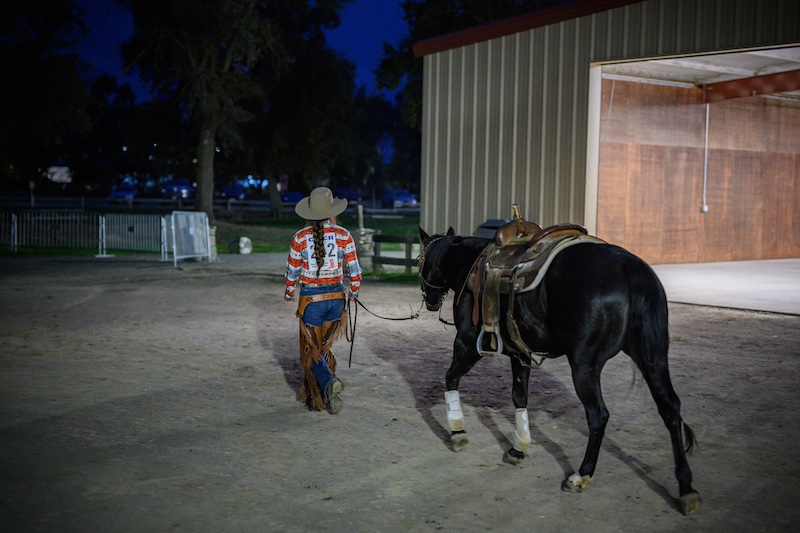Above: Stella Aleman, 13, on her horse, Ice Baby, during a high school rodeo tournament in Corning, CA. Stella says the world of high school rodeo provided her with a supportive community after being bullied in school. (Credit: Manuel Ortiz)
Leer en español
It’s tournament day in Corning, a small town an hour north of Sacramento. Hooves and boots slosh through the mud on a rainy Saturday as over 100 competitors prepare for a series of events, from roping to cutting to pole bending and rough stock.
Thirteen-year-old Stella Aleman beams, her eyes aglow as she sits astride her horse, Ice Baby, amid a scrum of giddy cowgirls.
Radiating confidence, you’d never guess that just weeks prior she’d been the target of a vicious bullying campaign. “I was being bullied for riding horses, people calling me horsey girl or cowgirl. People would yell ‘yee haw’ around me, thinking it’s funny,” she recalls. “It made me feel like I wasn’t normal. It made not want to do this anymore.”
Stella’s mother, Andrea Aleman, is a registered nurse in Clear Lake, 60 miles to the south in Lake County. “It was very, very tough,” she says, tears welling up as she describes her daughter’s struggle over recent months. The threats became so constant Stella had to be taken out of school and placed in independent study. The local police eventually got involved. “My daughter is very small … they were threatening to beat her up.”
Bullying can leave lasting scars, for victims and perpetrators alike, impacting grades, graduation rates, even employment and career opportunities later in life. In the worst cases, it can lead to severe depression or suicidal ideation.
Over 30% of students in California reported being bullied at least once between 2016-2020, according to data from the California Healthy Kids Survey. And while race or sexual orientation are often motivating factors, in Stella’s case she was targeted because of her involvement in rodeo.
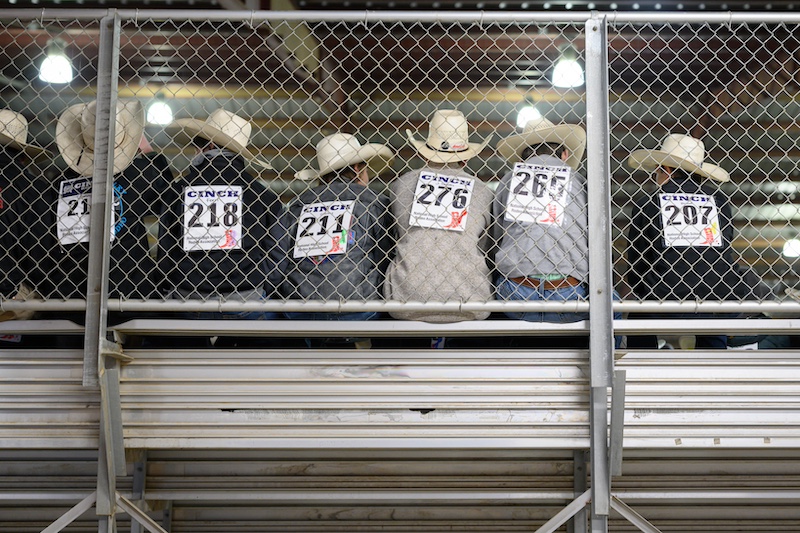
A year-round lifestyle
Despite its popularity – 43 million Americans identify as rodeo fans, according to the Professional Rodeo Cowboys Association – rodeo remains a niche sport among California’s youth. The California High School Rodeo Association (CHSRA) counts some 800 members statewide.
The cost – up to $10,000 a year per horse in California – the commitment and time needed to properly care for and train the animals, and the travel that comes with participating in state and national tournaments are just some of the limiting factors.
Yet if their immersion with rodeo sets them apart, the irony is that the high school rodeo community sees itself as rooted in a tradition that grew out of the cattle ranches that have long been a mainstay, even defined, much of California’s rural economy, especially in the north. Far from being outliers, the people here – young and old – will tell you they are holding on to something precious, a bulwark against an ever-encroaching, hyper-digital urban world.
For the past 10 years Marco Luna has served as president of CHSRA District 2, which stretches from Bay Area adjacent counties Marin and Sonoma to Humboldt and Del Norte in the far north (there are 9 districts total across California). A retired cop and the son of Mexican immigrants, he spends his time tending his ranch in Humboldt when he isn’t shepherding rodeo families to and from competitions.
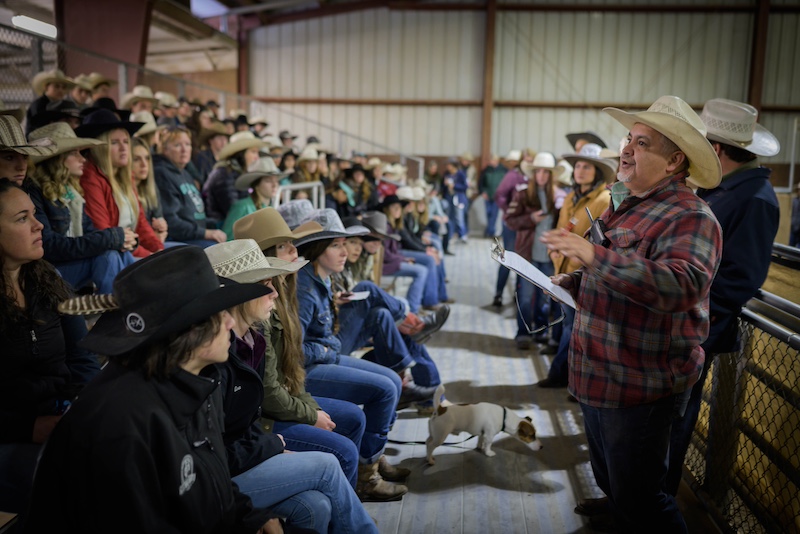
Unlike seasonal sports like basketball or baseball, he says, rodeo is a year-round “lifestyle,” requiring commitment and dedication.
There’s the daily feeding, the brushing, the training, the bonding. The horses “have to be your friend,” he stresses, a relationship Luna describes as “therapeutic” for the young people involved. Recognizing its value, colleges like Cal Poly Humboldt are now considering adding rodeo to their athletic program, Luna says.
“Some kids struggle in school, in life, in family life, and this is their way out,” he continues. “These kids build those bonds with these animals and then they go out and compete.”
A culture of caring
Efforts to curtail or prevent bullying abound in California, many of them focused on education and awareness around the harms that bullying can cause. For Luna, the magic of high school rodeo comes through the connection kids share with their horses, and the values that extend out from there, values he believes can help curb the impulses that drive bullying in the first place.
Competitors sign codes of conduct, they sign social media contracts, they have to keep their grades up. Fall short on any of these and they can’t compete. “We want them to go out there and become good public citizens,” says Luna.
It’s that culture of caring that prompted Gracelyn Minic-Hayes, 16, to spearhead a Blue Up day tournament in honor of National Bullying Prevention Month in October. “I was cyber bullied pretty heavily by anonymous accounts, which means I have no idea who they were,” says Minic-Hayes, this year’s District 2 queen, adding she was targeted because of a minor speech impediment.
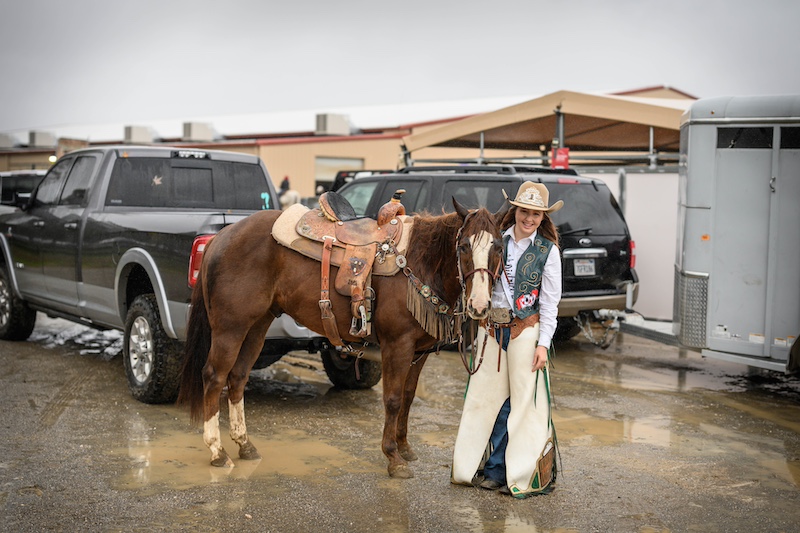
Things got so bad, she says, that she began to feel anxious walking into school, unaware of who was targeting her. “But I knew that when I walked into the rodeo, everyone just loved you. There was no bullying here.”
Minic-Hayes is aware that kids like Stella are being bullied because of their involvement with the rodeo. “We’re different and we’re weird and our views don’t line up with theirs,” she says, which is partly why she pushed for the Blue Up day event. “At the end of the day, bullies are just trying to knock you down. But here you can learn, and you can grow, and you can be you. And I just thought, some of our kids in our district might need a reminder.”
‘My best friends’
Stella hops off Ice Baby and takes her foreleg in her hands. The contrast is striking, this powerful animal towering over a diminutive teen who with practiced confidence gently rubs her down before taking her muzzle in her hands and planting a kiss. Ice Baby leans in for another.
Weeks earlier Stella’s Instagram account of some 3000 followers had been shut down after someone complained of animal abuse. Animal rights activists have long pushed for a statewide ban on rodeo. Los Angeles appeared set Tuesday to join San Francisco and Pasadena in banning rodeo events within city limits.
In Stella’s telling, the school bullies and activists become almost synonymous with a world that sees her passion as something to ridicule or take away entirely.
“It was very hard to get over it,” she says. “Then I realized, it doesn’t matter if other people are bullying me, because I got a big old family here. It’s really helped me get through it.”
She adds, “These horses are like my best friends.”
This resource is supported in whole or in part by funding provided by the State of California, administered by the California State Library in partnership with the California Department of Social Services and the California Commission on Asian and Pacific Islander American Affairs as part of the Stop the Hate program. To report a hate incident or hate crime and get support, go to CA vs Hate.



